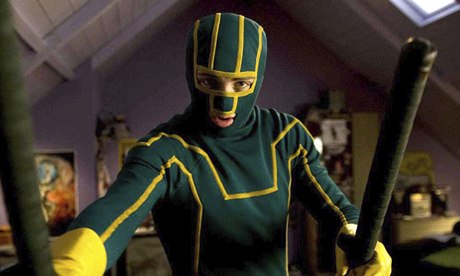
And so it begins. Those smart folks at Sony have worked out that it doesn't matter so much if every other Hollywood studio owns the rights to more superheroes on the big screen than you do – so long as you have the ingenuity to invent your own masked crimefighters to light up the multiplexes.
Earlier this week, the Japanese-owned company behind the Spider-Man films revealed that it is teaming up with Stan Lee, the nonagenarian comic book legend behind dozens of Marvel's best-known characters, to bring a new superhero to cinemas. Sony's Avi Arad, who produced all four Spidey outings, will take on the challenge of helping Lee transform the comic book movie landscape once again.
It all sounds rather exciting, even if Lee's contributions to the superhero pantheon in recent decades have been rather less vital than those he helped dream up during the 1960s. But it got me wondering how this dynamic duo are going to come up with anything remotely original in a massively oversaturated marketplace. Just as pertinently, what characteristics best suit a masked vigilante for the 21st century, one who may never get to grace the pages of a comic book but needs to sparkle on the big screen?
Mark Millar's Kick-Ass is probably the closest we've come to a 21st-century superhero. But that character exists in a postmodern universe where comic-book readers become their own (haphazard) heroes. While the series has performed adequately at the box office, Lee's superhero will need to cater to a more mainstream audience for Sony to put up the greenbacks to bring him or her to multiplexes in style.
There is no point conjuring up a character whose skills or style resemble existing characters. So heroes based on animal tropes really ought to be avoided unless they throw up particularly intriguing scenarios. In any case, most of these have already been used up.
The legendary heroes created in the 1930s and 40s, characters like Batman and Superman, began life as simple crimefighters at a time when the streets of big cities really were unsafe at night. Up until the 1990s, such an approach might have made sense. But US crime figures have dropped radically since the bad old days, and the world does seem like a safer place. The need for vigilantes of the old-fashioned kind is arguably weaker than it once was.
On the other hand, if superheroes are supposed to defend the weak against the powerful, Lee could do worse than adopt the anti-corporate clothing worn by Green Arrow in the current hit TV series Arrow. For me, the show has too few jagged edges to be compulsive viewing, but there's an impressive darkness at its heart that could never have been present before Christopher Nolan's Batman trilogy. When it comes to serious villainy, modern history tells us that the greedy rich will always contribute more than their fair share.
Iron Man has probably been the big screen's biggest superhero smash of the past decade, perhaps because audiences can easily imagine a world in which technology transforms the ordinary into the outlandish. It's also worth taking a look at the brilliance of Alex Garland's Dredd, which failed outside the UK box office but will go down in celluloid history as a genuine attempt to do something new with the comic book milieu. A superhero story set just a few years into the future might open up all kinds of possibilities for new characters, whether through mutations or dramatic shifts in technology.
High-concept sci-fi TV shows such as JJ Abrams' Fringe have proved capable of creating and maintaining decent audiences on the small screen. That same kind of ingenuity might be required to reinvent the superhero zeitgeist for the 21st century. Baffling as Fringe often was, it maintained a current of vibrant futuristic invention that set it apart from the more familiar alien invasion sci-fi scenarios seen in Marvel fare such as The Avengers.
Then, of course, we have the worlds of mysticism and the occult. Marvel's rumoured Doctor Strange movie might have ploughed these furrows by the time Sony's superhero makes it to cinemas; otherwise, they are surely ripe and fertile material for new storylines. Just don't give our brand new hero a silly magic ring, a la Green Lantern.
If a Hollywood producer handed you a multimillion dollar budget and told you to go and invent a new hero for these times, what would you come up with? What skills would your hero have, and what would he or she be called? Would they be male or female, old or young, rich or poor, wise or foolhardy? Our existing celluloid superheroes are all familiar figures. Sony and Lee are right about one thing: it's definitely time for someone new.

